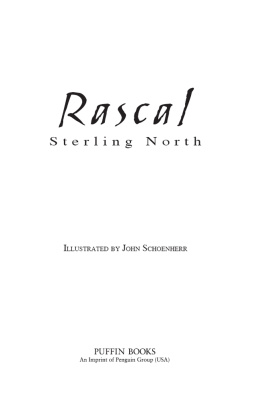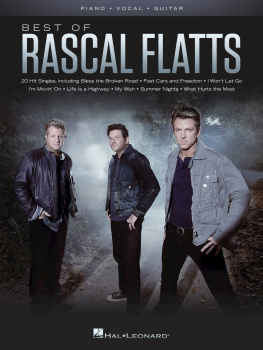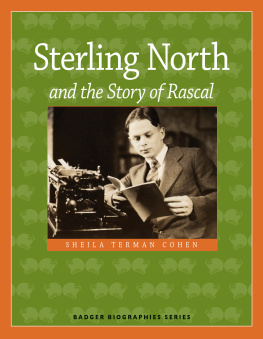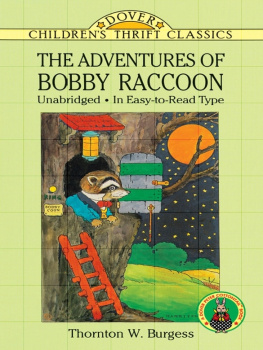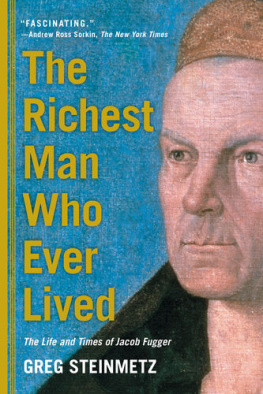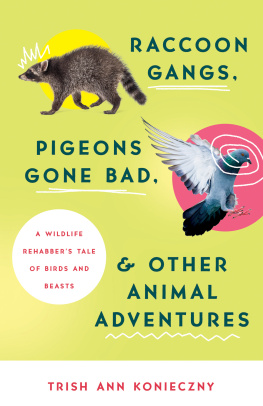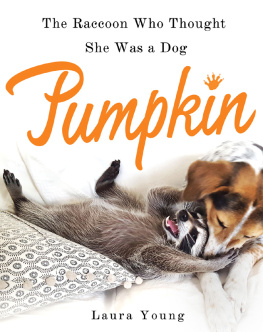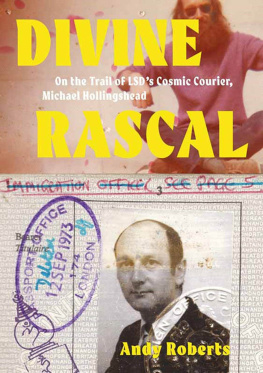North Sterling - Rascal
Here you can read online North Sterling - Rascal full text of the book (entire story) in english for free. Download pdf and epub, get meaning, cover and reviews about this ebook. City: Wisconsin, year: 2005;1990, publisher: Penguin Young Readers Group;Puffin Books, genre: Non-fiction. Description of the work, (preface) as well as reviews are available. Best literature library LitArk.com created for fans of good reading and offers a wide selection of genres:
Romance novel
Science fiction
Adventure
Detective
Science
History
Home and family
Prose
Art
Politics
Computer
Non-fiction
Religion
Business
Children
Humor
Choose a favorite category and find really read worthwhile books. Enjoy immersion in the world of imagination, feel the emotions of the characters or learn something new for yourself, make an fascinating discovery.
- Book:Rascal
- Author:
- Publisher:Penguin Young Readers Group;Puffin Books
- Genre:
- Year:2005;1990
- City:Wisconsin
- Rating:4 / 5
- Favourites:Add to favourites
- Your mark:
- 80
- 1
- 2
- 3
- 4
- 5
Rascal: summary, description and annotation
We offer to read an annotation, description, summary or preface (depends on what the author of the book "Rascal" wrote himself). If you haven't found the necessary information about the book — write in the comments, we will try to find it.
Rascal — read online for free the complete book (whole text) full work
Below is the text of the book, divided by pages. System saving the place of the last page read, allows you to conveniently read the book "Rascal" online for free, without having to search again every time where you left off. Put a bookmark, and you can go to the page where you finished reading at any time.
Font size:
Interval:
Bookmark:
  A surprise encounter Dig em out, Wowser, I shouted. In another minute Wowser was making the dirt fly, and Oscar and I were helping in a frenzy of excitement. Ill bet its a fox, I panted hopefully. Probably an old woodchuck, Oscar said. But we couldnt have been more surprised when a furious mother raccoon exploded from her lair screaming her rage and dismay. Wowser nearly fell over backward to avoid the flying claws and slashing little teeth. A moment later the big raccoon had raked her way up a slender oak tree. Thirty feet above us she continued to scream and scold. In plain sight now, within the den, we found four baby raccoons, a month old perhaps.... Three of the little raccoons, hearing their mothers call, trundled with amazing swiftness into the hazel brush to follow her, and were gone. Oscar, however, was quick enough to cup one kit in his cap, our only reward for our laborbut reward enough, as time would prove. Remembering My Father, B Y A RIELLE N ORTH O LSON My brother and I loved the stories our dad told us about Rascal, the pet raccoon he had when he was a boy. One time when we were little, we pestered him for too many stories. We were on vacation, and our parents must have wanted some quiet time. So our dad suggested that we buy the next story with one hundred water-polished, quartz pebbles. We ran over to a mountain stream nearby, waded in the cool water, and gathered the lovely pebbles. When we had one hundred, we handed them to our dad, and he repaid us with another story. But he didnt only tell storieshe made up poems and verses. He would tape a poem/riddle on each Christmas present, challenging us to solve the secret of whatever my mother had wrapped inside each package. And when we grew weary on long car trips, he sometimes amused us with funny verses. He wrote beautiful poetry, too. When he was a student at the University of Chicago, his poems were printed in major literary magazines and won national intercollegiate prizes. Our dad was an enthusiastic man. Much of what he loved as a boy, he continued to love as an adult: his passion for animals, for reading and writing, for nature, for fishing, for music. When my brother and I were young, our parents let us have lots of cats, a beloved collie dog, a wild and crazy horse, and, at one point, five hundred chickens and three cows. My dad taught us about birdsongs, tree identification, and wildlifejust as he had been taught by his mother and father. We fished together, and we delighted in watching the raccoons and birds and deer who lived in the woods surrounding our home. Daytimes, my dad worked as literary editor of the Chicago Daily News, and later as literary editor of newspapers in New York City. He read and reviewed hundreds of books every year. Evenings and weekends he wrote his own books. Bookcases lined the walls of almost every room in our house. My mother arranged the books as carefully as in a library, making it easy to find whatever we were seeking. When we were sitting in the living room after dinner, we often shared with each other whatever we were reading. One of the books that I wrote many years later, The Lighthouse Keepers Daughter, was inspired by a paragraph my dad read aloud to me about a lonely, windswept island off the northeast coast of the United States. My dad had a remarkable memory for everythingfor things that happened when he was incredibly young, for conversations over the years, for information of all sorts, for the thousands of books he had read, andto our pleasurefor songs and for poetry. He played the banjo and the piano by ear. He couldnt read a note of music, but once hed heardlets say a song by Gershwinhe would pull his banjo out of the closet or sit down at the piano and play it, belting out the lyrics. Both he and my Aunt Jessica could quote poetry for hours. I always was amazed by the number of poems those two kept in their heads. In a diary written by my Aunt Jessica when my dad was only four years old, she said that he had already memorized a large chunk of Sir Walter Scotts Marmion and all of the Night Before Christmas! He was eight years old when one of his poems was published in St. Nicholas magazine. I am endlessly grateful for the poetry my dad recited to me and for the poetry he taught me, training my ear to appreciate fine writing from childhood ona poem, for instance, by William Blake: To see a World in a Grain of Sand, And a Heaven in a Wild Flower, Hold Infinity in the palm of your hand, And Eternity in an hour. Memory is important for a writer, and this is particularly true for my dad. His memory of fine poetry and literature helped him to recognize and to write smooth, flowing, and elegant prose. The fact that he could remember something someone said to him, decades earlier, helped him to craft very natural conversations in his books. His memory for the emotions that he felt in his childhood helped him to make Rascal so poignant that I still laugh and cry every time I read it. But such a marvelous memory can be a two-edged sword, because the sorrow about his mothers death remained as fresh in his mind as his many joys. The reception Rascal received surely was one of those special joys. The book was named a Newbery Honor Book by childrens librarians. It was on the New York Times bestseller list for weeks. Countless teachers read it to their classes; reviewers praised it; and it was translated into many languages. Rascal won many state awards voted for by students, and Disney made it into a movie. Fan letters overflowed the mailbox. Rascal secured our dads place in the world of childrens literature well beyond his own lifetime. I feel such tremendous respect and love for my dad. He was an amazing, vital, compassionate, and talented man. I miss him, but I am so glad that he lives on in his books. Arielle North Olson More about Sterling North When Sterling North was fifteen years old, polio almost killed him. He was told that he would never walk again, that he would be in a wheelchair for the rest of his life. But he decided to fight back. He built an exercise machine with ropes and pulleys and various weights of wood. He forced himself to work hard with it every day, and even took to swimming for miles with a heavy brace on his leg. He managed to build up his muscles and he did walk again, even though one leg remained weak. Sometimes the damage from polio is so great, no amount of exercise can restore function, but Sterling never settled for anything less than his best effort, whether it was in regaining his health or in his writing. Many years after his bout with polio, Sterling North wrote a wonderful letter, encouraging a young friend who was refusing to exercise her own polio-damaged legs. Dont give up, he wrote to her. I know you will get well just as I did. I know that you have a long and happy life ahead of you. Think how lucky you and I are. We have learned by experience that great obstacles can be overcomethat nothing can stop us in this difficult world. And remember that Renoir despite severe arthritis painted pictures in his old age, that Beethoven despite deafness continued to write great music, and that Roosevelt was changed from a relatively callow young man into great presidential timber by polio. What others have done we too can do in some measure. |
Font size:
Interval:
Bookmark:
Similar books «Rascal»
Look at similar books to Rascal. We have selected literature similar in name and meaning in the hope of providing readers with more options to find new, interesting, not yet read works.
Discussion, reviews of the book Rascal and just readers' own opinions. Leave your comments, write what you think about the work, its meaning or the main characters. Specify what exactly you liked and what you didn't like, and why you think so.

